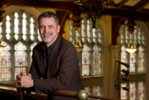Dr. Joel Faflak
The Search for Happiness
What does “being happy” mean? This question preoccupies Joel Faflak in his current research. Dr. Faflak, a Professor in the Department of English, is currently writing a book-in-progress on the rise of psychiatry in the Romantic period. He describes psychiatry as emerging out of the Scottish Enlightenment “long before Freud.” Psychiatry’s Romantic origins represented a turn toward exploring ways to restore happiness and well-being in the melancholy and the mad. This focus on happiness remains unabated in our time, but has now become a type of ideology. “If the Enlightenment gave us the desire for happiness as a worthy goal, we are now trained to desire this desire, rather than happiness itself,” Dr. Faflak says.
Another research project involves tracing human dysfunction and the search for happiness through analyzing musical theatre. “All great musicals are centred in some kind of trauma and guide the audience to the feeling that it is possible to ‘get happy’ again,” Dr. Faflak observes. “For example, South Pacific is based in the experience of racism; My Fair Lady deals with class discrimination; Rent depicts the AIDS crisis.”
The use of theorists, such as Žižek, is crucial to Dr. Faflak’s research. “I think theory is as much an act as a discipline or methodology. It unsettles and reorganizes categories of thought in order to confront us with the unthought. Theory is a profound empowerment to be speculative, an act of radical imagination that cuts through and across things that may not at first seem obvious to us.”
Dr. Faflak co-edited (with Tilottama Rajan) William Blake: Modernity and Disaster, released by University of Toronto Press in August 2020.



